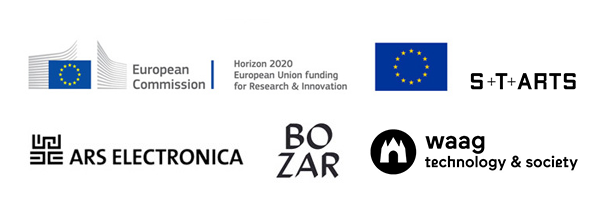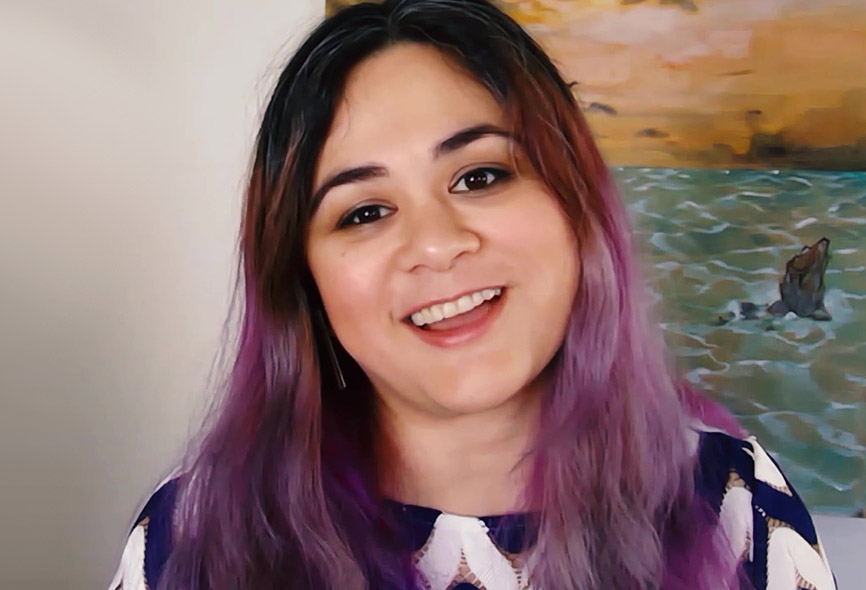Şerife Wong is an artist, activist and ethics consultant on the subject of artificial intelligence. She advises us to pay much more attention to AI and how it changes us as a society. As program manager of the Autodesk Residency program, she has been involved with many interdisciplinary teams and has observed valuable interconnections of several areas of science, technology, and arts – a goal that the STARTS Initiative is also devoted to.
Please note: The closing date for submissions to the 2019 STARTS Prize is March, 11th, 2019. Further information can be found starts-prize.aec.at!
You’ve been dealing with the ethical perspective of new technologies for some time now. What do we have to pay particular attention to when we surround ourselves with more and more artificial intelligence?
Şerife Wong: It’s challenging for our laws and policies to keep up with the pace of innovation. We can start by paying more attention but we already pay a lot of attention to technology. It makes our lives more convenient, it makes us more connected, it’s fun, it makes us productive, but to pay real attention we need to start to observe. And we start with ourselves. We pay attention what tech we are using, how we are using it, what changes we’ve seen in ourselves, then we move on to a mediate circle: What are the techs benefits? What are its negative impacts we’ve seen in other people? And then we can move to the companies: How they are using our data? Are they in a line with our values? Who’s making these tools? Especially when things are intended for a global market it is really important how team diversity is. Then we start to pay attention to a bigger picture: How is society using technology? If we take just algorithmic decision making tools for example there is an absolutely everything and there is no accountability or transparency and they are often wrong, they are used when we apply for jobs, they decide who gets the resumes, they decide who gets to get alone, who gets into a school, they are used in law enforcement, they determent what neighborhoods the police, they are used in criminal justice, determining who gets a parole. And then when we bring our full attention to this, I think it is really impossible not to be concerned with how AI systems are being integrated into our lives when we have just begun to study their societal impacts.
With the Icarus Salon, you have created an initiative that addresses precisely these questions. One of them is also shown on the website of the Icarus Salon, which I would like to pass on to you: What’s missing in the field of AI and society?
Şerife Wong: AI and society is a rapidly growing field. There are many incredible people and intuitions working on core problems – fairness, transparency, accountability, governance, the feature of work, etc. It is vital for this field to be interdisciplinary and including a larger variety of people and increasing the dialogue between them. It’s a primary aim of Icarus Salon. To just do a metaphor, in the parable of the blind men and the elephant: We have lots of people coming together with different opinions, a blind man touches a trunk and thinks is a trunk-like creature and so forth. But even no one is really wrong but they are limited in their perception. So we only have researchers and scientists working on these problems. We are all going to be working on a leg, and we only have government and policy makers or academia working on this. And then we are only gonna really reveal like a tale, a private torso. The AI impacts everyone. And everyone needs to be at the table to solve it. What is missing when we are looking at this great big elephant is greater communication and collaboration between everyone filling out the different areas and then also we need a full 360 degrees of it for a variety of people around this elephant. We need more artists, we need more students, we need employees from every type of job, we need more social scientists, we need everybody.
For the first time, you are a juror for the European Commission’s STARTS Prize. Where do you personally see similarities between science, technology and art?
Şerife Wong: Science, tech and art happen in the symbiotic relationships since the very beginning. As soon as we had technology to farm we were able to start forging. Then we started to create culture which enabled us to discover more technology and create more culture and learn more about the world. We had more science, more innovation, and then we are not just surviving, we are creating a surplus, and then we have a very complex economic system. But the things that have developed together are not really that far apart. They differ maybe in the language that we use but in essence they are all about human potential, curiosity and transformation. Even the word technology comes from the Greek word techne, which is a word for craftmenship and art, it is a sort of philosophical vassal for the craft. And I think these lines are blurring more, the pace of technology is increasing and these things are coming closing together.
At the Autodesk Technology Center Pier 9 in San Francisco, you dealt with the future of new technologies such as robotics, virtual reality and 3D printing. What framework do you think is needed in Europe for cooperation in the fields of science, technology and art to function better?
Şerife Wong: It is vital to us as a society to have greater cooperation between arts, science and technology. There a lot of artists who use technology and science in their work. It’s both a tool and a topic of exploration likewise many scientists and technologists are pushing the limits of what can be done creatively. At Pier 9 we saw creators who not even want to be called artists, we saw researchers who just discovered that maybe their work can be considered as art. These places of research and innovation and businesses really need artists who are embedded in their process. I love them the residency at Bell Labs, they used to bring an artist like Rauschenberg. They are still doing that. They have artists working with researchers. We’ve also seen other corporate fellowships and residency centers at Google and Adobe and Autodesk. We’ve also seen private institutions who have fun collaborative experiments between artists and scientists. These fellowships are successful for what their intention is – which is increasing creativity or pushing possibilities and maybe getting more insights. But I don’t think that even that is enough.
“I would really like to see teams at every innovations center go a little bit further and have truly interconnected artists and scientists teams that integrate their ideas and don’t just borrow concepts.”
Do you have a tip for the entrants to the STARTS Prize 2019?
Şerife Wong: I’m so excited to see this year’s applications. I love the funky intersection between genres and research that no one’s has ever thought before. And in my experience, creators already find it difficult to talk about their own work and hybrid projects they are special difficult to verbalize. You can’t or need to invent your own language for something that has never been done before. Especially if it is on the edges and fringes what research and art fields have historically look like. It is also hard to talk about what you do when it is private evolution or private process. So, believe in your work, often it speaks for itself but if you are stuck then ask people who are familiar with what you do for feedback and how to improve your documentation. And I wish you the very very very best of luck!

Şerife (Sherry) Wong (US/TR) is an artist, activist, and AI ethics consultant. In 2018, she founded Icarus Salon, an initiative to enrich the dialogue on the ethics of emerging technology. She was a Program Manager for the Autodesk Residency Program and created the Impact Residency at Pier 9 Technology Center (San Francisco, 2015-2018) where she worked with over 100 leading creative technologists exploring the future of robotics, AR/VR, engineering, 3D printing, and architecture. Şerife Wong has also worked on the development team at the Electronic Frontier Foundation and was assistant editor of Artnet Magazine. As an artist, she has exhibited internationally at venues such as Art Basel Miami, Shanghai Art Fair, FIAC Paris, ARCO Madrid, and Art Cologne. She is now focusing on her AI ethics work, which includes serving on a scientific advisory panel for USAID and Duke University on the future use of AI to address humanitarian challenges and researching AI ethics and governance for the Center for Advanced Study in the Behavioral Sciences at Stanford University.
This project has received funding from the European Union’s Horizon 2020 research and innovation programme under grant agreement No 732019. This publication (communication) reflects the views only of the author, and the European Commission cannot be held responsible for any use which may be made of the information contained therein
